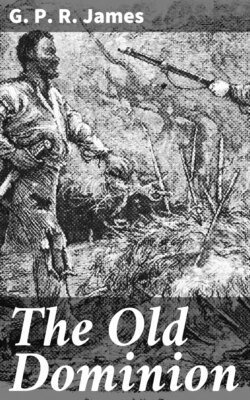Читать книгу The Old Dominion - G. P. R. James - Страница 8
На сайте Литреса книга снята с продажи.
CHAPTER IV.
ОглавлениеTable of Contents
On the 19th June, 1831,1 set out from the city of Norfolk about seven o'clock in the morning; my departure had been fixed at six: but who ever sets out at the hour at which he has determined? Nobody, certainly, in Virginia, where time and punctuality seem to be, in the opinion of all men, very impracticable abstractions, little worth the attention of reasonable men. First of all, Zed was too late in bringing up the horses, and he had at least a hundred good excuses for the delay. Next, we had forgotten, in buying the saddle-bags, to buy any straps to fix them to the saddles. Then, no stores--or shops, as we call them, were yet open to supply the deficiency. And again, no pack-thread was to be found to supersede the need of straps. Finally, all the gentlemen of the inn with whom I had formed acquaintance, and who happened to be up, must needs shake hands and drink a mint-julep with me before I departed. It seemed the good ancient custom of the stirrup-cup, and I was fain to lump my companions altogether, and take one deep draught to their health ere I rode on. It was a glorious morning; the sun had not yet heated the air, and the wind blew from the north-west. After crossing the river we journeyed very comfortably for between two and three hours. Zed, radiant as Ph[oe]bus, was proud of new clothes, a new master, and a new horse; and to say truth, rode very well, although not very gracefully. Indeed, his broken leg, which had been set somewhat crooked, apparently enabled him to grasp his beast with greater vigour, making a sort of hoop round the animal's body, which would have been very difficult to shake off. We made the best of our way while it was cool; but between nine and ten we began to have indications of what the weather intended to do with us. They may say what they like of Calcutta, Jamaica, and the African coast; but I am sure that Norfolk, in the summer season, is the hottest place upon the surface of the earth. I began to feel the perspiration dropping from under my hat; and the roads seemed full of ruts and irregularities which I had not perceived before. Suddenly, my horse put his feet into a deep gutter, and made an awful stumble, but did not come down.
"Ah, massa," cried Zed, who had been keeping nearly in a line with me, "you hold de middle of de road, or you get into tobacco-ruts."
"Tobacco-ruts!" I exclaimed, "what do you mean by tobacco-ruts? I see no tobacco, Zed." My new groom laughed aloud.
"Don't you know, massa," he cried, "people used to grow tobacco on this road? Take two cart-wheels and an axle, put tobacco between them, or round de axle, wid two coloured gentlemen to roll it on, and push for'ard all de way to Norfolk."
"They don't surely do so now, Zed?"
"Not very long ago," replied he. "I recoleck very well seeing hundreds of tons roll along here. Sometimes dere was a freshet. Den you would see--oh, gorry--a whole heap of wheels and tobacco, and de gentlemen all dancing and playing on de banjo on de bank. Oh, dose was merry times, massa; but dey all become so damn democratic now." I must here remark upon two points of the negro character. First, that they are exceedingly fond of expletives, and not very choice in their selection; and, secondly, that, to a man, as far as I have seen, they are exceedingly conservative, nay, aristocratical in their notions. I will not pause to inquire whether they have any very definite ideas upon the distinction of parties, or whether they attach any significance to the objurgations they use; but certain it is that they have an abhorrence for the name of democrat, and occasionally swear somewhat blasphemously without any special occasion. We were soon obliged to bring our horses to a walk; but we had made good speed over the first twenty miles of our journey. At the end of the next five, we had the happiness of seeing a house on the right-hand side of the road, which promised us rest and shelter from the hot sun till the coolness of evening might be expected. It was a long, low house of two stories--or rather one story and a half, for the second was only half as tall as the first--with a verandah or porch extending all along the front. Beneath the shade of this verandah, in a large arm-chair of plain maple wood, from which he seemed incapable of rising, sat an elderly man with white hair, leaden complexion, and a dull, heavy unprepossessing countenance. In girth he was enormous; and indeed his obesity seemed the effect of disease, for there was an unhealthy heaviness in his whole aspect which was painful to look upon. His dress was negligent; his waistcoat and his shirt were unbuttoned; he had not been shaved for many days; and his hat had fallen, by accident and negligence, into a variety of curious dents and twists, which left no vestige of its original shape. A long tobacco-pipe was in his mouth, from which he continued to inhale puffs of smoke, slowly and leisurely, without paying the slightest apparent attention to anything going on around him. He saw us dismount at the door in the most impassible mood in the world; and as all was still and silent about the house, I should have doubted whether it was a tavern or not, had I not seen a tall bare pole in front, and painted on the frieze of the porch,
